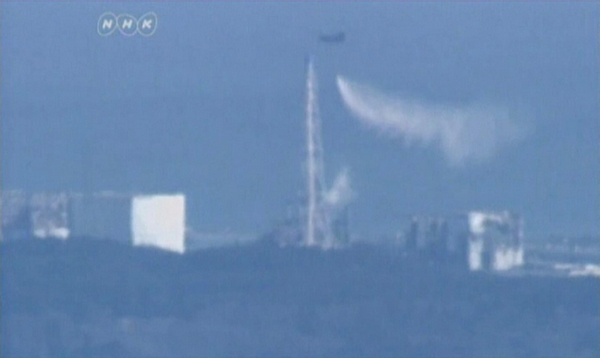Asia
Japan begins air drop on stricken reactor
Updated: 2011-03-17 14:21
(Agencies)
|
 A military helicopter drops water on the reactors at the Fukushima Daiichi nuclear plant in this still image taken from video footage March 17, 2011. Operators of the quake-crippled nuclear plant in Japan dumped water on overheating reactors on Thursday while the United States expressed growing alarm about leaking radiation and urged its citizens to stay well clear of the area. [Photo/Agencies] |
A Cabinet spokesman, Noriyuki Shikata, said the government had no plans to expand the evacuation plan. But the US Embassy issued an advisory urging all Americans living within 50 miles (80 kilometers) of the plant to leave the area or at least remain indoors.
The chief of the UN nuclear agency, Yukiya Amano, said he would go to Japan to assess what he called a "very serious" situation and urged Tokyo to provide better information to his organization.
Other countries have complained that Japan has been too slow and vague in releasing details about its rapidly evolving crisis at the complex of six reactors along Japan's northeastern coast.
The 180 emergency workers who were working in shifts to manually pump seawater into the overheating reactors to cool them and stave off complete meltdowns were emerging as heroes as they persevered in circumstances in which no radiation suit could completely protect them.
Japan's health ministry made what it called an "unavoidable" change Wednesday, more than doubling the amount of radiation to which the workers can be legally exposed.
"I don't know any other way to say it, but this is like suicide fighters in a war," said Keiichi Nakagawa, associate professor of the Department of Radiology at University of Tokyo Hospital.
The government asked special police units to bring in water cannons - usually used to quell rioters - to spray onto the spent fuel storage pool at unit 4.
"By deploying defense personnel and riot police, we're doing our best to tackle the situation by spraying water to cool down the reactors. We sincerely hope that this mission will go well," Shikata said.
Elevated levels of radiation were detected well outside the 20-mile (30-kilometer) emergency area around the plants. In Ibaraki prefecture, just south of Fukushima, officials said radiation levels were about 300 times normal levels by late Wednesday morning. It would take three years of constant exposure to these higher levels to raise a person's risk of cancer.
A little radiation has also been detected in Tokyo, triggering panic buying of food and water.
Specials

Earthquake Hits Japan
A massive 8.8 magnitude quake hit the northeast coast of Japan on March 11,2011.

NPC & CPPCC sessions
Lawmakers and political advisers gather in Beijing to discuss major issues.

Pictures: quake aftermath
A massive earthquake hit Japan hard, leaving thousands dead.